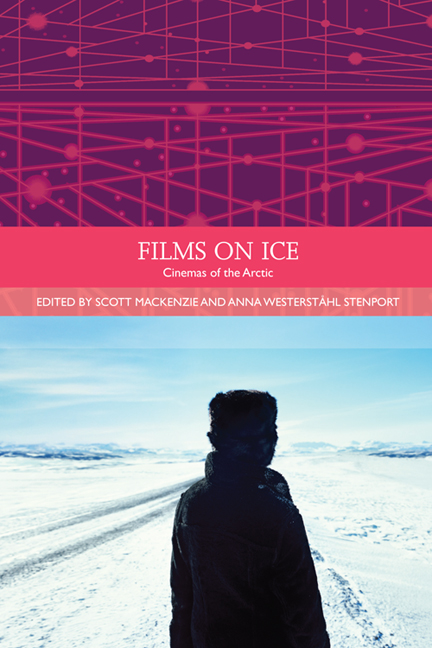Book contents
- Frontmatter
- Contents
- List of Illustrations
- Acknowledgements
- Traditions in World Cinema
- Introduction: What are Arctic Cinemas?
- PART I GLOBAL INDIGENEITY
- 1 ‘Who Were We? And What Happened to Us?’: Inuit Memory and Arctic Futures in Igloolik Isuma Film and Video
- 2 Northern Exposures and Marginal Critiques: The Politics of Sovereignty in Sámi Cinema
- 3 Frozen in Film: Alaska Eskimos in the Movies
- 4 Cultural Stereotypes and Negotiations in Sámi Cinema
- 5 Cinema of Emancipation and Zacharias Kunuk's Atanarjuat: The Fast Runner
- 6 Cosmopolitan Inuit: New Perspectives on Greenlandic Film
- 7 Arctic Carnivalesque: Ethnicity, Gender and Transnationality in the Films of Tommy Wirkola
- PART II HOLLYWOOD HEGEMONY
- PART III ETHNOGRAPHY AND THE DOCUMENTARY DILEMMA
- PART IV MYTHS AND MODES OF EXPLORATION
- Notes on the Contributors
- Index
2 - Northern Exposures and Marginal Critiques: The Politics of Sovereignty in Sámi Cinema
from PART I - GLOBAL INDIGENEITY
Published online by Cambridge University Press: 05 September 2016
- Frontmatter
- Contents
- List of Illustrations
- Acknowledgements
- Traditions in World Cinema
- Introduction: What are Arctic Cinemas?
- PART I GLOBAL INDIGENEITY
- 1 ‘Who Were We? And What Happened to Us?’: Inuit Memory and Arctic Futures in Igloolik Isuma Film and Video
- 2 Northern Exposures and Marginal Critiques: The Politics of Sovereignty in Sámi Cinema
- 3 Frozen in Film: Alaska Eskimos in the Movies
- 4 Cultural Stereotypes and Negotiations in Sámi Cinema
- 5 Cinema of Emancipation and Zacharias Kunuk's Atanarjuat: The Fast Runner
- 6 Cosmopolitan Inuit: New Perspectives on Greenlandic Film
- 7 Arctic Carnivalesque: Ethnicity, Gender and Transnationality in the Films of Tommy Wirkola
- PART II HOLLYWOOD HEGEMONY
- PART III ETHNOGRAPHY AND THE DOCUMENTARY DILEMMA
- PART IV MYTHS AND MODES OF EXPLORATION
- Notes on the Contributors
- Index
Summary
In 2012, the Finnish Film Foundation (FFF) established a funding initiative devoted to developing Sámi film production, a move marking a significant development acknowledging the marginal status of Sámi cinema within the Nordic countries. While the fund is part of the FFF's focus on developing marginal film production practices and themes, and thus not a long-term charity case, its introduction is indicative of a range of key considerations. First, Sámi cinema has received increased attention in the Nordic countries in the 2000s as both a filmmaking practice and a topic of representation. Reflecting the geoculturally contested status of the Sámi land (the Sápmi), covering northernmost Norway, Sweden, Finland and Russia (the Sámi population is estimated at 164,000 globally, of whom 133,000 are residents in Sápmi), the Sámi have been infrequently represented by their dominant ‘host’ populations in the past. The majority of these depictions emerge from Finland and Norway (see Chapter 4 in this collection, by Monica Kim Mecsei, for more on Norwegian film production). Finnish producers have depicted the Sámi as villains or mystical forces of nature in films such as The Curse of the Witch (Noidan kirot, Teuvo Puro, 1927) and The White Reindeer (Valkoinen Peura, Erik Blomberg, 1952), respectively. In both these cases, the focus is on conceptualising Lapland as an untamed territory especially threatening to the young women whose gendered otherness acts as a suitable cause by which to establish white masculine dominance over the region as the men have to act as heroes containing the threat posed by Sámi mysticism. In contrast to this long history of exotic depictions of the ‘mythical’ Sámi, contemporary documentary and fiction films by Sámi directors such as Katja Gauriloff and Paul-Anders Simma, among others, focus on indigenous rights and the complexities of coexistence within nation-state structures. This attention is of a qualified nature, however, as both the films and their directors are considered as distinct ‘others’ in relation to the dominant national cultures. This attitude positions the Sámi in a problematic role characterised by alterity and difference, a position that the very act of evoking one's historical and sovereign identity reinforces.
- Type
- Chapter
- Information
- Films on IceCinemas of the Arctic, pp. 45 - 58Publisher: Edinburgh University PressPrint publication year: 2014



